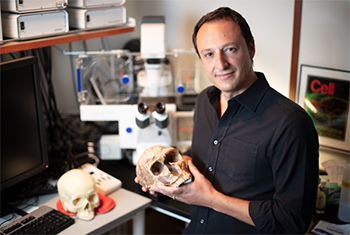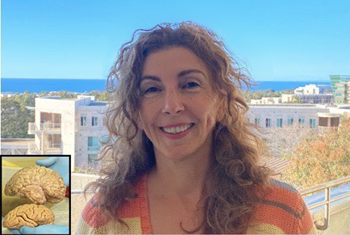About the Archealization Center (ArchC)
The Archealization Center (ArchC) at UC San Diego is a multi-disciplinary center focused on the functional investigation of archaic human genetic variants to answer a fundamental question in evolutionary biology and philosophy: what makes us human?
ArchC is led by co-Directors Alysson R. Muotri, Professor of Pediatrics and Cellular & Molecular Medicine and Director of the Stem Cell Program; and Katerina Semendeferi, Professor of Anthropology and Director of the Laboratory for Human Comparative Neuroanatomy at UC San Diego.

Current views of human evolution, supported by the fossil record, indicate that many branches of the human lineage arose but only one species survived to the present. Our natural interest in understanding the processes that make us human goes beyond mere anthropocentrism and philosophical debates about the human condition. New genomic tools provide high-resolution information about alterations that may have resulted in the evolution of species, including our own. These differences will most likely be subtle, impacting specific cell types at precise moments in time during development, making translation of genetic differences into phenotypic data all the more important.

Until now, phenotypic data was only obtainable from comparisons between modern humans and extant primates such as chimpanzees, highlighting differences in brain development that have evolved since our last common ancestor roughly 6 million years ago. Yet, the more recent evolutionary changes in brain development – such as those differentiating us from extinct hominin relatives, remain unknown.
A major advancement at the foundation of ArchC – ancient DNA sequencing – has opened the door for comparative paleogenomics by providing us with the genetic information of our closest relatives. To date, the primary focus of comparative genetics between archaic and modern humans has been on shared, or introgressed, sites. These are sites where modern human populations have adopted archaic elements via ancestral interbreeding and admixture. In this way, groups of Homo sapiens arriving into a new area were able to co-opt some of the adaptations that other groups of humans had developed over millennia of natural selection in that environment. Examples of this phenomenon range from immunity to local pathogens to physiological adaptations for high-altitude hypoxia. While a great deal of interest has been placed on the clinical benefits and consequences of these introgressed sites, we find that studying the sites where modern and archaic humans diverge may be of equal or greater clinical value.
ArchC will focus instead on divergent sequences: sites where the modern human lineage experienced a mutation differentiating it from the archaic lineage. A subset of these sites presumably holds the key to modern human uniqueness, but which ones? Our center seeks to model the functional impact of archaic hominin variants into cutting-edge in vitro models of brain development, allowing for the first-time demonstration of the effect of these variants on specific cellular and developmental processes.

ArchC is fusing paleogenomics, genome editing technologies and stem cell biology to re-create human organoids carrying extinct genetic variants for functional analyses. Organoids are tridimensional, self-assembled populations of human cells derived from pluripotent stem cells. These organoids can mimic several aspects of a target tissue. ArchC will initially focus on neuro-archealization, leveraging on recent protocols developed by the Muotri lab to create brain organoids capable of generating neural oscillations.
ArchC started its neuro-archealization program with a focus on Neanderthals and Denisovans. Our first investigation revealed 61 genetic variants in protein-coding genes with non-synonymous alterations. Our efforts focused on the NOVA1 gene, a master regulator of hundreds of downstream genes during human neurodevelopment. The NOVA1 archaic version was engineered in human pluripotent stem cells using genome editing technologies. Brain organoids derived from these lines revealed several alterations at molecular, cellular and network levels (Trujillo et al, Science 2021).
This systematic approach currently taking place at ArchC will reveal the genomic alterations that allow for the unique aspects of our modern human mind.
Support Us
Support stem cell research at UC San Diego under the direction of the Program Director. Currently under the direction of Alysson Muotri, Ph.D. (Fund Number: 4010)